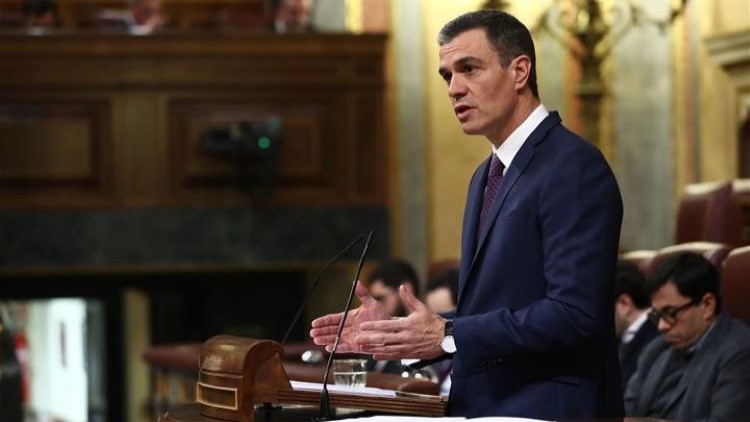Ángel Collado
First in the Bureau of Congress and then in the Constitutional Court, Pedro Sánchez begins this Monday to put all his forces and influences at the service of his Catalan pro-independence allies to guarantee his stay in power.
On Monday, the Socialists and Communists will grant the status and subsidies of a parliamentary group to the two separatist parties that failed to win more than 1.8 per cent of the votes in the general elections. And while they force the rules of the Congress, they are already negotiating the amnesty demanded by the former president of the Generalitat Carles Puigdemont so that, otherwise named, it can pass the filter of the Constitutional Court.
Alberto Núñez Feijóo is making his short-lived victory in the elections count with requests for meetings with the other parties to prepare his investiture session on 26 September, while the PSOE and Sumar (the coalition that brings together the extreme left headed by Yolanda Díaz) are working to incorporate Junts per Catalunya (Puigdemont’s party) into the self-styled “progressive” front.
The outgoing government coalition needs the seven MPs obtained by Junts for Sánchez to be able to carry out his own investiture in October after Feijóo fails in his first attempt, which is the most foreseeable scenario and what the incumbent government insists on taking for granted.
The first bill for the Socialist leader to win that support will be paid in the Bureau of Congress when that governing body of the Parliament today gives the go-ahead to the formation of two Catalan separatist parliamentary groups without any of them meeting the requirements of the House’s rules of procedure.
Neither ERC nor Junts reach the minimum number of seats and percentage of votes established in the current regulations to have a parliamentary group, but the PSOE and Sumar will “lend” them deputies in an unprecedented scheme that will be sanctioned by the Bureau of Congress. Please please, socialists and communists have a majority in the Bureau, even though they do not have a majority in the Chamber, thanks to the vote of all the pro-independence and nationalist formations, as left-wing as ERC or Bildu, or of the opposite sign as PNV or Junts.
As a result of the swap, the seven deputies of Puigdemont and the seven of ERC will be equal in speaking time in debates, presence in the bodies of the House, subsidies and electoral propaganda to those of the groups that do meet the requirements.
With the percentages of 1.8 percent of the vote in the case of Esquerra and 1.6 percent in the case of Junts achieved at the polls, the Catalan separatists will have the same parliamentary rank and means as the national parties, between 32 percent like the PP and 12 percent for Sumar. The PNV also has its own group, but in its case it complies with the rule of exceeding 15 per cent in the constituencies where it was presented, and in the three constituencies of the Basque Country as a whole it reached 25 per cent of the votes.
The next bill of privileges that Sánchez, and also Yolanda Díaz on her own, are negotiating with the Catalan secessionists already affects the constitutional framework and the independence of Justice: impunity for the crimes committed in the separatist attempt of 1 October 2017. Puigdemont is demanding an amnesty law both for himself and for all his supporters, including the shock groups called CDR that are in charge of the street riots.
The Constitution expressly prohibits general pardons and, although the amnesty goes much further, Sumar already argues that it does have a constitutional place. In the PSOE they have stopped recognising that it would be unconstitutional, as they had always argued, until they needed Puigdemont’s votes for Sánchez. The government press prefers to speak of “penal relief” measures and the acting head of the Executive forgets his old criterion against it in order to divert the issue to the Constitutional Court.
The current composition of the Constitutional Court is a guarantee for the continuity of Sanchism, as the coalition government stresses by extolling the clear “progressive” majority of the court of guarantees. There had already been this theoretical hegemony of left-leaning members in the past, but never before have there been so many members with such direct links to the head of the Executive as there are now.
The Constitutional Court is presided over by Cándido Conde-Pumpido, a magistrate who already served as Attorney General of the State between 2004 and 2011 under the previous socialist government. Moreover, the key to the “progressive” majority in the arbitration body is reinforced by the entry this year of the former Minister of Justice under Sánchez, Juan Carlos Campo, and the former Director General of the Presidency, also under Sánchez, Laura Díaz.
Díaz adds to her record the fact that she has worked for the Catalan Generalitat, precisely in the reform of the statute of autonomy which later had to be amended by the TC due to its manifest unconstitutionality. Conde-Pumpido, Campos and Díaz will now ensure that the “penal relief” that Sánchez is preparing for Puigdemont does not look like an amnesty.







